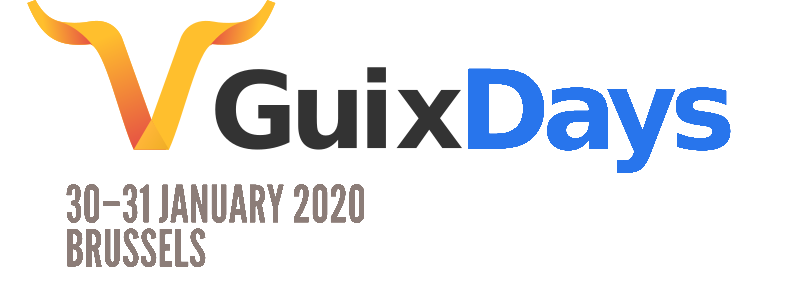Meet Guix at FOSDEM
As usual, GNU Guix will be present at FOSDEM on February 1st and 2nd. This year, we’re happy to say that there will be quite a few talks about Guix and related projects!
- On Saturday afternoon, Guix: Unifying provisioning, deployment, and package management in the age of containers by Ludovic in the main track on containers and security, will reflect on what GNU Guix has to offer to users and how it compares to other approaches—from CONDA and pip to Flatpak and Docker.
- Sunday morning starts with Efraim talking in the Rust devroom about Packaging Rust programs in GNU Guix—telling Rust programmers about the needs of a distro like Guix, and about the journey building infrastructure for Rust packages in Guix.
- Next up is GNU Guix as an alternative to the Yocto Project by Mathieu in the Distributions devroom will demonstrate how to use GNU Guix to build a root filesystem for an embedded device.
- Later on in the HPC, Big Data, and Data Science devroom, Ludovic will present Towards reproducible Jupyter notebooks which will talk about Guix-Jupyter, which aims to make Jupyter notebook self-contained and to support reproducible deployment.
- In the same devroom, Efraim will present Sharing Reproducible Results in a Container about how Guix solves the issue of reproducibility and deployment of containers.
- Finally in the Minimalistic, Experimental and Emerging Languages devroom, janneke with GNU Mes, Scheme-only bootstrap and beyond will report on three years of hard work tackling one of the most pressing security issues of operating systems—the “trusting trust” attack. Janneke will present exciting bootstrapping achievements and their integration in Guix.
- Pierre will present Universal package & service discovery with Guix on how he intends to leverage the Guile programming language to boost searchability of packages and services via intuitive user interfaces and semantics.
- Pjotr will talk about why minimalism matters in computing with Lisp everywhere!
- Andy will discuss all the work that has gone into the upcoming Guile 3—which will soon power Guix—making it a faster implementation, with Celebrating Guile 2020.
- Last, Chris Marusich will give an Introduction to G-Expressions, the magic behind them, and how to use them in Guix.
The Minimalistic, Experimental and Emerging Languages devroom will also feature talks about about Racket, Lua, Crystal, Nim, and Pharo that you should not miss under any circumstances!

For the third time, we are also organizing the Guix Days as a FOSDEM fringe event, a two-day Guix workshop where contributors and enthusiasts will meet. The workshop takes place on Thursday Jan. 30st and Friday Jan. 31st at the Institute of Cultural Affairs (ICAB) in Brussels.
Again this year there will be few talks; instead, the event will consist primarily of “unconference-style” sessions focused on specific hot topics about Guix, the Shepherd, continuous integration, and related tools and workflows.
Attendance to the workshop is free and open to everyone, though you are invited to register (there are only a few seats left!). Check out the workshop’s wiki page for registration and practical info. Hope to see you in Brussels!
About GNU Guix
GNU Guix is a transactional package manager and an advanced distribution of the GNU system that respects user freedom. Guix can be used on top of any system running the kernel Linux, or it can be used as a standalone operating system distribution for i686, x86_64, ARMv7, and AArch64 machines.
In addition to standard package management features, Guix supports transactional upgrades and roll-backs, unprivileged package management, per-user profiles, and garbage collection. When used as a standalone GNU/Linux distribution, Guix offers a declarative, stateless approach to operating system configuration management. Guix is highly customizable and hackable through Guile programming interfaces and extensions to the Scheme language.
Pokud není uvedeno jinak, příspěvky na blogu na těchto stránkách jsou chráněny autorskými právy příslušných autorů a zveřejněny za podmínek licence CC-BY-SA 4.0 a podmínek licence GNU Free Documentation License (verze 1.3 nebo novější, bez invariantních částí, bez textů na přední straně obálky a bez textů na zadní straně obálky).